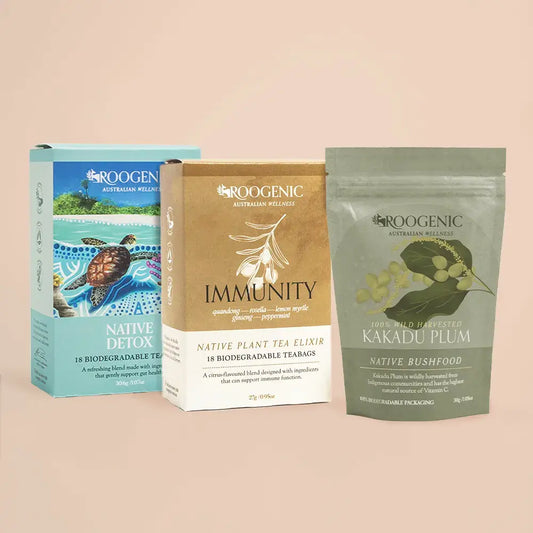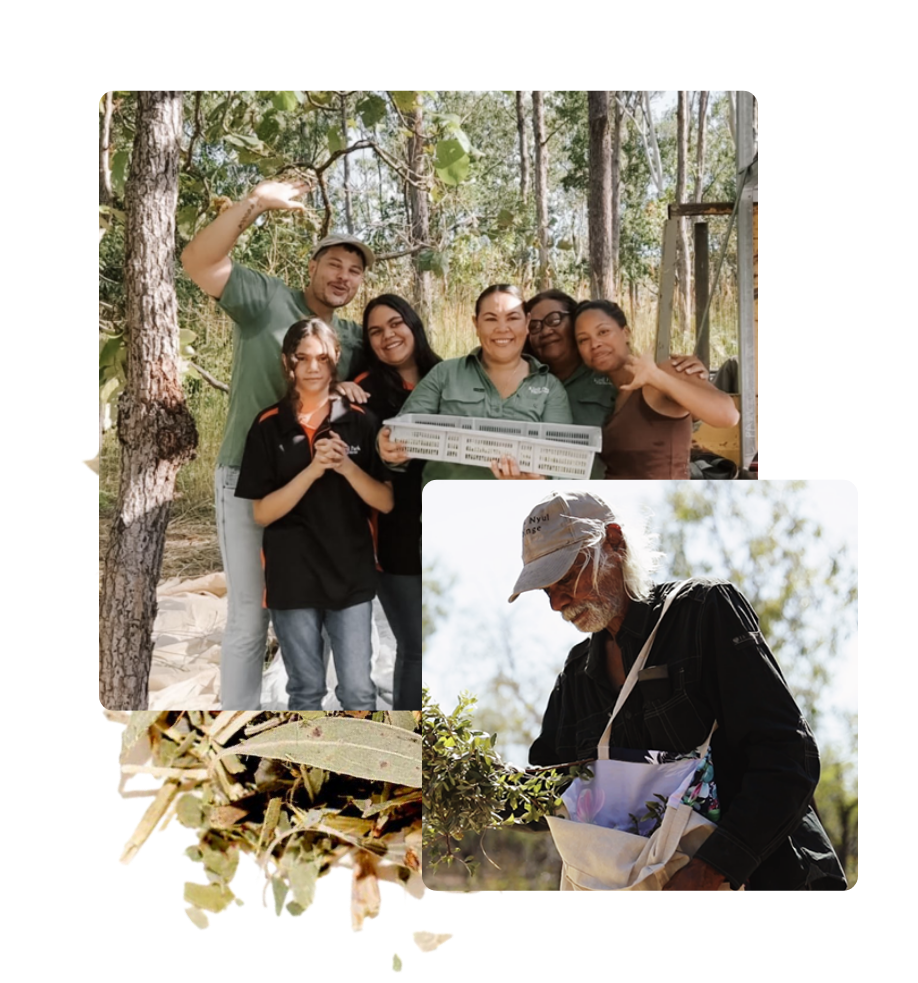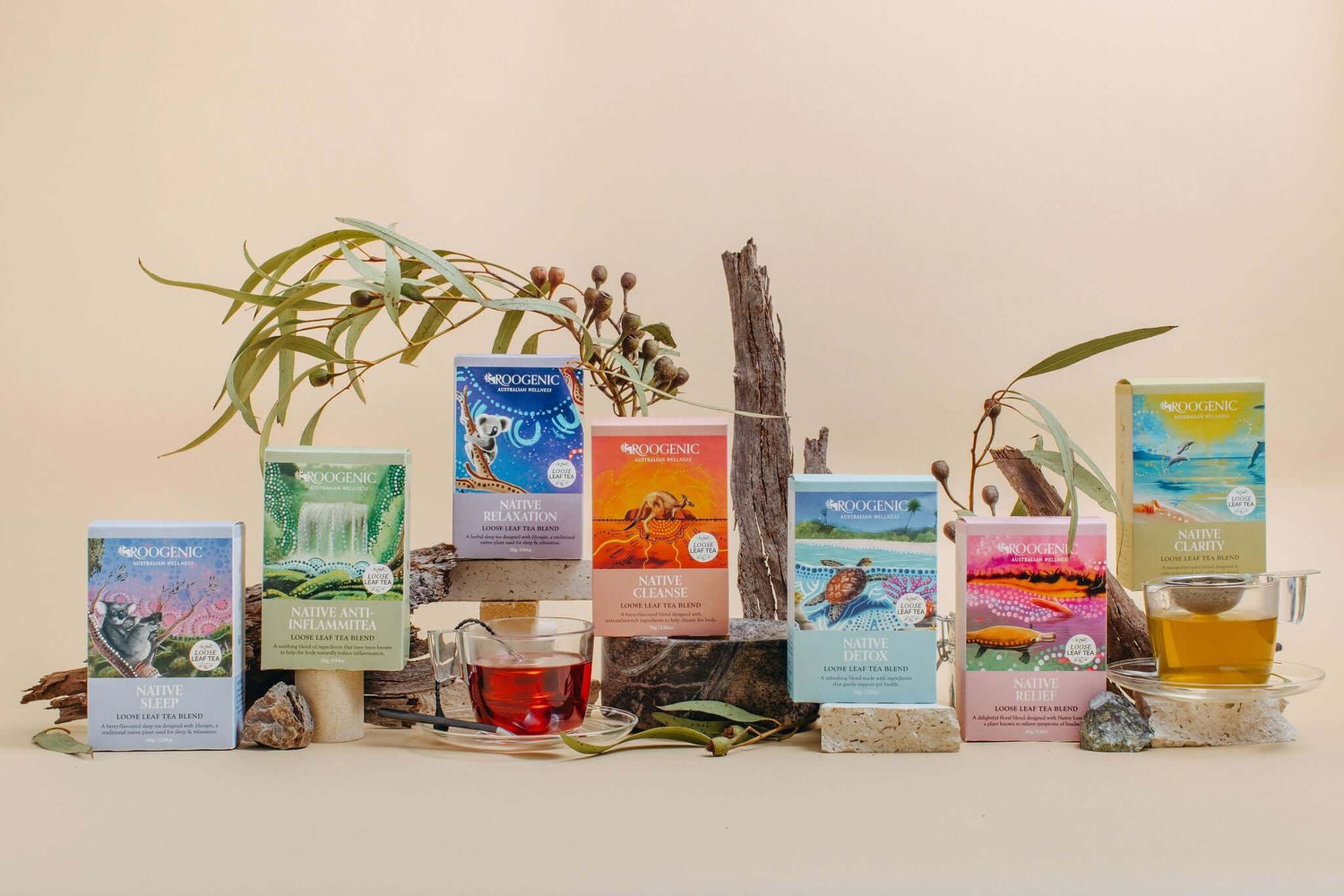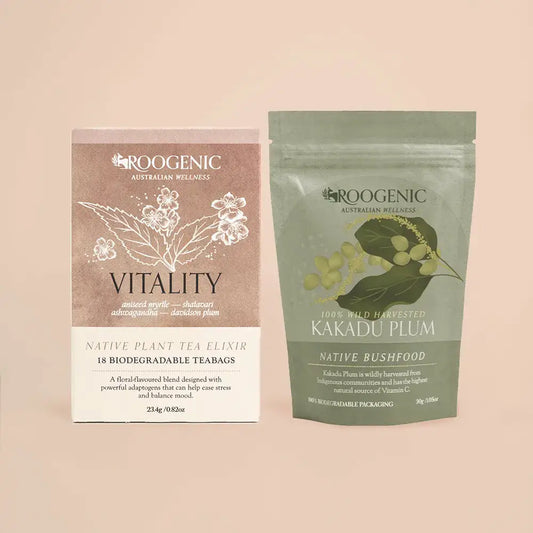Immunity Bundles
Boost your immune system naturally with Roogenic’s Immunity Bundle, featuring premium teas, Kakadu Plum powder and Australian Honey designed for daily immune support.
-

 Sale 32% off
Sale 32% offUltimate Immunity Bundle
5.0Rated 5.0 out of 5 stars5 ReviewsRegular price From $42.85Regular priceUnit price / perWas $62.85Sale price From $42.85Detox tea, Immunity Tea & Kakadu PlumSale
Which bundle is right for me?
-
Bundles for Sleep
Sleep is essential for both mental and physical well-being, yet many struggle to achieve a restful night. Roogenic’s Sleep Bundles are specially crafted to promote relaxation, reduce anxiety, and fight insomnia using the healing properties of native Australian plants like Lemon Myrtle and Kakadu Plum. Reclaim your nights with these natural blends designed to improve mood and promote deep, restorative sleep.
-
Bundles for Gut Health
Gut health is the foundation of overall wellness. Roogenic’s Gut Health Bundles are designed to improve digestion, reduce bloating, and support a healthy microbiome. Featuring native Australian ingredients such as Riberry and Wattleseed, these bundles address a wide range of gut concerns and promote long-term digestive health.
-
Bundles for Immunity Boost
Strong immunity is your first line of defence against illness. Our Immunity Bundles contain potent, natural ingredients like Kakadu Plum and Bush Tomato, known for their immune-boosting properties. These blends are carefully designed to strengthen the immune system with vitamins and antioxidants, ensuring your body stays resilient and healthy all year round.
-
Bundles for Inflammation
Inflammation can lead to discomfort and disrupt daily life. Roogenic’s Inflammation Bundles combine the healing properties of native ingredients like Kunzea and Tasmanian Pepperberry to help alleviate joint pain, headaches, and gut disturbances. These natural remedies provide targeted relief for inflammation-related issues, allowing you to feel better in your body every day.
-
Bundles for Women Health
Support your health at every stage of life with our Women’s Bundles, tailored to meet the unique needs of women. Designed by naturopaths, these bundles help reduce PMS symptoms, nourish the body during pregnancy, and support lactation during nursing. Embrace your feminine glow and feel empowered with these holistic, plant-based remedies.
-
Bundles for Stress & Energy Support
Reclaim your vitality with our Stress & Energy Bundles, crafted to support energy and reduce stress. Designed by naturopaths, each blend features ingredients like Quandong, Lemon Myrtle, Bacopa, Siberian Ginseng, and Shatavari Root to rejuvenate from within. Feel focused, calm, and revitalised with these plant-powered solutions.
Bundle FAQs
Roogenic’s Bundles Collection features a selection of our most popular wellness products, carefully combined to address specific health concerns, including sleep, immunity, gut health, women’s health, and inflammation. Each bundle is crafted using natural Australian ingredients to provide holistic support for your health and wellness needs.
Choosing the right bundle depends on your unique health concerns. If you need better sleep, our Sleep Bundles will help you unwind and relax. For boosting immunity, our Immunity Bundles are ideal. If you’re seeking gut support or relief from inflammation, our Gut Health and Inflammation Bundles are for you. We’ve made it easy to find the bundle that best fits your wellness goals.
Yes, our bundles are designed for daily use, with blends formulated to support long-term wellness. Most customers find that incorporating their bundle into their daily routine helps achieve lasting results for their specific health concerns.
Absolutely. At Roogenic, sustainability is at the heart of everything we do. We work directly with Indigenous farmers and small growers to source our rare native Australian ingredients, ensuring ethical sourcing and sustainable farming practices. Our eco-friendly packaging reflects our commitment to protecting the planet.

For people & planet
At Roogenic, respect for the environment, Indigenous communities, and each other is at the heart of everything we do. We are proud to partner with Indigenous growers and small farmers to source rare, high-quality native ingredients. Our commitment to sustainability is reflected in our eco-friendly packaging and profit-sharing initiatives with Indigenous communities, ensuring that your wellness journey supports both people and the planet.




Read more about Australian Wellness
-

Gut Health While Travelling: 5 Expert Tips
When you're on the road, your gut is often the first to feel the strain, from new foods and time zones to changes in routine. If you've ever dealt with bloating, sluggish digestion or even a sudden bout of traveller’s diarrhoea, you’ll know just how much your gut can affect your entire travel experience. The good news? With a few smart strategies, it’s possible to support and protect your digestive system naturally while enjoying every moment of your trip. In this article, we’re sharing five expert-backed tips to help maintain gut health while travelling, including one simple, portable solution you’ll want to pack in your bag. Why Gut Health is Essential While Travelling Your gut microbiome, home to trillions of beneficial bacteria, plays a key role in digestion, immunity, and even mood. Travel-related disruptions like unfamiliar bacteria, poor food hygiene, stress, and irregular meals can throw this delicate balance off. In fact, traveller’s diarrhoea affects up to 60% of travellers, often due to exposure to new microbes, time zone stress, and dietary changes. That’s why keeping your gut in check is one of the best things you can do to feel good and stay energised on the go. 1. Pack Gut Restore Sachets – Your Daily Gut Support When it comes to maintaining gut health while travelling, Roogenic’s Gut Restore Powder Sachets are a game-changer. Designed to reduce bloating, maintain gut lining integrity, and support immunity, these sachets contain a powerful blend of prebiotics, probiotics and native Australian ingredients, all without needing refrigeration. Why they’re perfect for travel: Portable & compact – easy to pack only what you need No refrigeration required – ideal for warm climates Prebiotics + Probiotics – support digestion and build microbiome resilience Immune support – helps prevent disruptions before they start Naturopath tip: Saccharomyces boulardii is a standout probiotic for travel. Unlike traditional probiotics, it’s a beneficial yeast that helps combat traveller’s diarrhoea and is unaffected by antibiotics. Explore Gut Restore Sachets 2. Prioritise Prebiotic-Rich Foods Even while travelling, try to include foods high in prebiotic fibres to feed the good bacteria in your gut. Think oats, bananas, asparagus, and apples. These plant fibres ferment in the gut, producing short-chain fatty acids like butyrate that nourish your gut lining and reduce inflammation. Benefits of prebiotics while travelling: Reduces bloating and indigestion Regulates bowel movements Supports gut lining and immune health Quick tip: If fresh produce isn’t safe to eat, rely on quality supplements like Gut Restore that contain natural prebiotics. 3. Stay Hydrated with Clean Water & Electrolytes Dehydration is common when flying or spending time in hot, humid climates. It also contributes to digestive sluggishness. Drink bottled or purified water regularly, and consider adding natural electrolytes if you’re sweating more than usual. Travel hydration tips: Avoid ice in drinks unless you’re sure the water is safe Refill a reusable bottle with filtered or bottled water Consider coconut water or an electrolyte blend on active days 4. Support Your Immune System Naturally Up to 70% of your immune system lives in your gut. When your microbiome is strong, it’s better equipped to defend against unfamiliar bugs. Travel stress, disrupted sleep and poor nutrition can all impact your immune resilience, so consider natural ways to keep it supported. Natural immune-support strategies: Take daily probiotics (like those in Gut Restore) Bring Kakadu Plum Powder with you – rich in natural vitamin C to support immune defences Stay rested and manage stress with calming teas like our Sleep Teas 5. Eat Mindfully and Choose Safe Foods Trying local cuisine is part of the adventure, but be mindful of hygiene. Buffets, street food and seafood from questionable sources can expose you to pathogens that your gut isn’t used to handling. Safer food choices while abroad: Opt for hot, freshly cooked meals Avoid uncooked salads unless from reputable venues Say no to ice unless made from purified water Choose fruit you can peel yourself (like bananas or oranges) Your Healthy Gut, No Matter Where You Go Travel doesn’t have to mean digestive discomfort. With a few mindful habits and the support of Roogenic Gut Restore Powder Sachets, you can maintain balance and feel your best no matter the destination. Ready to support your gut naturally on your next trip? Explore our Gut Health Collection or read more wellness tips in our Blog. Explore more about Gut Health: The Power of Prebiotics and Probiotics Best Ingredients for Gut Health
Read moreGut Health While Travelling: 5 Expert Tips
When you're on the road, your gut is often the first to feel the strain, from new foods and time zones to changes in routine. If you've ever dealt with bloating, sluggish digestion or even a sudden bout of traveller’s diarrhoea, you’ll know just how much your gut can affect your entire travel experience. The good news? With a few smart strategies, it’s possible to support and protect your digestive system naturally while enjoying every moment of your trip. In this article, we’re sharing five expert-backed tips to help maintain gut health while travelling, including one simple, portable solution you’ll want to pack in your bag. Why Gut Health is Essential While Travelling Your gut microbiome, home to trillions of beneficial bacteria, plays a key role in digestion, immunity, and even mood. Travel-related disruptions like unfamiliar bacteria, poor food hygiene, stress, and irregular meals can throw this delicate balance off. In fact, traveller’s diarrhoea affects up to 60% of travellers, often due to exposure to new microbes, time zone stress, and dietary changes. That’s why keeping your gut in check is one of the best things you can do to feel good and stay energised on the go. 1. Pack Gut Restore Sachets – Your Daily Gut Support When it comes to maintaining gut health while travelling, Roogenic’s Gut Restore Powder Sachets are a game-changer. Designed to reduce bloating, maintain gut lining integrity, and support immunity, these sachets contain a powerful blend of prebiotics, probiotics and native Australian ingredients, all without needing refrigeration. Why they’re perfect for travel: Portable & compact – easy to pack only what you need No refrigeration required – ideal for warm climates Prebiotics + Probiotics – support digestion and build microbiome resilience Immune support – helps prevent disruptions before they start Naturopath tip: Saccharomyces boulardii is a standout probiotic for travel. Unlike traditional probiotics, it’s a beneficial yeast that helps combat traveller’s diarrhoea and is unaffected by antibiotics. Explore Gut Restore Sachets 2. Prioritise Prebiotic-Rich Foods Even while travelling, try to include foods high in prebiotic fibres to feed the good bacteria in your gut. Think oats, bananas, asparagus, and apples. These plant fibres ferment in the gut, producing short-chain fatty acids like butyrate that nourish your gut lining and reduce inflammation. Benefits of prebiotics while travelling: Reduces bloating and indigestion Regulates bowel movements Supports gut lining and immune health Quick tip: If fresh produce isn’t safe to eat, rely on quality supplements like Gut Restore that contain natural prebiotics. 3. Stay Hydrated with Clean Water & Electrolytes Dehydration is common when flying or spending time in hot, humid climates. It also contributes to digestive sluggishness. Drink bottled or purified water regularly, and consider adding natural electrolytes if you’re sweating more than usual. Travel hydration tips: Avoid ice in drinks unless you’re sure the water is safe Refill a reusable bottle with filtered or bottled water Consider coconut water or an electrolyte blend on active days 4. Support Your Immune System Naturally Up to 70% of your immune system lives in your gut. When your microbiome is strong, it’s better equipped to defend against unfamiliar bugs. Travel stress, disrupted sleep and poor nutrition can all impact your immune resilience, so consider natural ways to keep it supported. Natural immune-support strategies: Take daily probiotics (like those in Gut Restore) Bring Kakadu Plum Powder with you – rich in natural vitamin C to support immune defences Stay rested and manage stress with calming teas like our Sleep Teas 5. Eat Mindfully and Choose Safe Foods Trying local cuisine is part of the adventure, but be mindful of hygiene. Buffets, street food and seafood from questionable sources can expose you to pathogens that your gut isn’t used to handling. Safer food choices while abroad: Opt for hot, freshly cooked meals Avoid uncooked salads unless from reputable venues Say no to ice unless made from purified water Choose fruit you can peel yourself (like bananas or oranges) Your Healthy Gut, No Matter Where You Go Travel doesn’t have to mean digestive discomfort. With a few mindful habits and the support of Roogenic Gut Restore Powder Sachets, you can maintain balance and feel your best no matter the destination. Ready to support your gut naturally on your next trip? Explore our Gut Health Collection or read more wellness tips in our Blog. Explore more about Gut Health: The Power of Prebiotics and Probiotics Best Ingredients for Gut Health
Read more -

Natural Stress Management: 5 Tips That Actually...
Stress is a daily reality for many of us, whether it’s a restless night, work deadlines, or the mental load of everyday life. While we can’t always control our stressors, how we manage them makes all the difference. In this guide, you’ll explore natural stress management strategies designed to calm your body and mind. From understanding how stress affects your nervous system to using adaptogens and mindful rituals, these holistic approaches are simple, practical, and backed by expert insight from our in-house naturopath. What Is Stress? A Naturopathic Perspective Stress is your body’s natural response to a perceived threat. When triggered, your brain activates the sympathetic nervous system – your internal alarm – causing a surge of stress hormones like adrenaline and cortisol. You may experience: Rapid heart rate and breathing Muscle tension Increased blood sugar Heightened alertness This is the “fight or flight” response. It’s useful in emergencies, but when constantly activated by everyday stressors, it can disrupt your health. "Stress is highly subjective, it can be real, remembered or imagined. Even seemingly positive events, like weddings or travel, can activate the same physiological stress response." – Rebecca Rose, Naturopath BHSc. Why Managing Stress Matters According to the Australian Institute of Health and Welfare, chronic stress is linked to a range of long-term health conditions. Persistent activation of the stress response can lead to: High blood pressure and cardiovascular issues (AIHW, 2020) Inflammation and hormonal imbalances (Harvard Health, 2020) Weight gain and disrupted sleep (NIH, 2012) Reduced insulin sensitivity and increased risk of Type 2 diabetes (NIDDK) Suppressed immune function (Cleveland Clinic) That’s why finding natural ways to manage stress isn’t just helpful – it’s essential. 5 Natural Ways to Manage Stress 1. Turn Tea Time Into a Calming Ritual A warm cup of tea can offer more than comfort—it can ground you in the present. Herbal blends, especially those containing adaptogens, help regulate your stress response. Try this: Step away from screens for 10 minutes Brew a cup of Roogenic Vitality Tea Focus on the aroma, colour, and taste Use this moment as a mindful pause Vitality Tea features adaptogenic herbs and Davidson Plum, which offers antioxidant support and may help protect key systems affected by stress, such as the cardiovascular system. Early research also suggests it may support blood sugar regulation, though more human trials are needed (Antioxidants, 2020). 2. Move Your Body, Naturally Movement is one of the most effective natural stress relievers. It boosts feel-good hormones like: Endorphins Dopamine Serotonin These neurotransmitters help stabilise mood and promote a sense of wellbeing (Harvard Health). Easy ideas: Take a brisk walk Stretch or practise yoga Dance around the house Physical activity doesn’t have to be intense to help, it just needs to be consistent. 3. Eat for Resilience What you eat influences how your body handles stress. Nutrient-dense foods help fuel your nervous system and support hormonal balance. Tips from our naturopath: Focus on antioxidant-rich whole foods (e.g. leafy greens, berries, turmeric) Avoid overstimulating substances like caffeine, alcohol, and nicotine Reduce processed foods that can trigger inflammation and blood sugar spikes Your gut and brain are connected: When you nourish your gut, you’re also supporting mood, energy, and emotional balance (Harvard Health). 4. Reconnect with Stillness Stillness helps shift your body from stress mode into a state of rest and repair by activating the parasympathetic nervous system. Try: Meditation or breathwork (even 5 minutes can lower cortisol) Journaling to release mental clutter Walking in nature or sitting under a tree These practices invite calm and build emotional resilience over time. 5. Honour Rest and Boundaries Stress isn’t just about doing too much – it’s also about not resting enough. As our naturopath puts it, "You are a priority. Protect your time and energy the same way you would for someone you love." Support your nervous system by: Getting 7–9 hours of sleep each night Saying “no” to overcommitment Creating digital boundaries and daily pauses The Importance of Connection Connection is a natural buffer against stress. Spending time with loved ones or reaching out to a professional can: Reduce feelings of isolation Lower blood pressure Support immune function Improve longevity (Harvard Study of Adult Development) Soothe Stress, Naturally with Roogenic Creating small, intentional rituals—like brewing Roogenic’s Vitality Tea—can make a lasting difference in how your body handles stress. Explore more: Roogenic Native Relaxation Tea – perfect for winding down in the evening Roogenic Women's Vitality – supports mood and hormone balance Final Thoughts: Small Shifts, Big Impact Managing stress doesn’t require a complete lifestyle overhaul. Start with small, consistent changes. Sip herbal tea. Move gently. Breathe deeply. Honour rest. Each choice brings you one step closer to feeling calm, connected, and in control. Want more wellness tips? Explore our blog
Read moreNatural Stress Management: 5 Tips That Actually...
Stress is a daily reality for many of us, whether it’s a restless night, work deadlines, or the mental load of everyday life. While we can’t always control our stressors, how we manage them makes all the difference. In this guide, you’ll explore natural stress management strategies designed to calm your body and mind. From understanding how stress affects your nervous system to using adaptogens and mindful rituals, these holistic approaches are simple, practical, and backed by expert insight from our in-house naturopath. What Is Stress? A Naturopathic Perspective Stress is your body’s natural response to a perceived threat. When triggered, your brain activates the sympathetic nervous system – your internal alarm – causing a surge of stress hormones like adrenaline and cortisol. You may experience: Rapid heart rate and breathing Muscle tension Increased blood sugar Heightened alertness This is the “fight or flight” response. It’s useful in emergencies, but when constantly activated by everyday stressors, it can disrupt your health. "Stress is highly subjective, it can be real, remembered or imagined. Even seemingly positive events, like weddings or travel, can activate the same physiological stress response." – Rebecca Rose, Naturopath BHSc. Why Managing Stress Matters According to the Australian Institute of Health and Welfare, chronic stress is linked to a range of long-term health conditions. Persistent activation of the stress response can lead to: High blood pressure and cardiovascular issues (AIHW, 2020) Inflammation and hormonal imbalances (Harvard Health, 2020) Weight gain and disrupted sleep (NIH, 2012) Reduced insulin sensitivity and increased risk of Type 2 diabetes (NIDDK) Suppressed immune function (Cleveland Clinic) That’s why finding natural ways to manage stress isn’t just helpful – it’s essential. 5 Natural Ways to Manage Stress 1. Turn Tea Time Into a Calming Ritual A warm cup of tea can offer more than comfort—it can ground you in the present. Herbal blends, especially those containing adaptogens, help regulate your stress response. Try this: Step away from screens for 10 minutes Brew a cup of Roogenic Vitality Tea Focus on the aroma, colour, and taste Use this moment as a mindful pause Vitality Tea features adaptogenic herbs and Davidson Plum, which offers antioxidant support and may help protect key systems affected by stress, such as the cardiovascular system. Early research also suggests it may support blood sugar regulation, though more human trials are needed (Antioxidants, 2020). 2. Move Your Body, Naturally Movement is one of the most effective natural stress relievers. It boosts feel-good hormones like: Endorphins Dopamine Serotonin These neurotransmitters help stabilise mood and promote a sense of wellbeing (Harvard Health). Easy ideas: Take a brisk walk Stretch or practise yoga Dance around the house Physical activity doesn’t have to be intense to help, it just needs to be consistent. 3. Eat for Resilience What you eat influences how your body handles stress. Nutrient-dense foods help fuel your nervous system and support hormonal balance. Tips from our naturopath: Focus on antioxidant-rich whole foods (e.g. leafy greens, berries, turmeric) Avoid overstimulating substances like caffeine, alcohol, and nicotine Reduce processed foods that can trigger inflammation and blood sugar spikes Your gut and brain are connected: When you nourish your gut, you’re also supporting mood, energy, and emotional balance (Harvard Health). 4. Reconnect with Stillness Stillness helps shift your body from stress mode into a state of rest and repair by activating the parasympathetic nervous system. Try: Meditation or breathwork (even 5 minutes can lower cortisol) Journaling to release mental clutter Walking in nature or sitting under a tree These practices invite calm and build emotional resilience over time. 5. Honour Rest and Boundaries Stress isn’t just about doing too much – it’s also about not resting enough. As our naturopath puts it, "You are a priority. Protect your time and energy the same way you would for someone you love." Support your nervous system by: Getting 7–9 hours of sleep each night Saying “no” to overcommitment Creating digital boundaries and daily pauses The Importance of Connection Connection is a natural buffer against stress. Spending time with loved ones or reaching out to a professional can: Reduce feelings of isolation Lower blood pressure Support immune function Improve longevity (Harvard Study of Adult Development) Soothe Stress, Naturally with Roogenic Creating small, intentional rituals—like brewing Roogenic’s Vitality Tea—can make a lasting difference in how your body handles stress. Explore more: Roogenic Native Relaxation Tea – perfect for winding down in the evening Roogenic Women's Vitality – supports mood and hormone balance Final Thoughts: Small Shifts, Big Impact Managing stress doesn’t require a complete lifestyle overhaul. Start with small, consistent changes. Sip herbal tea. Move gently. Breathe deeply. Honour rest. Each choice brings you one step closer to feeling calm, connected, and in control. Want more wellness tips? Explore our blog
Read more -

What Are Sleep Phases?
Did you know that during sleep, your brain can be more active than when you're awake? Sleep isn’t just about resting, it’s a highly structured process that plays a vital role in energy restoration, cognitive function and emotional balance. Why Sleep Quality Matters The body cycles through four sleep phases roughly 4-6 times per night, with each cycle lasting around 90 minutes. To wake up feeling truly refreshed, you need both the right duration (7-9 hours) and high-quality sleep that allows you to reach the deeper stages. Understanding each phase of sleep can help you optimise your nightly rest and improve overall well-being. The Four Stages of Sleep & How to Support Them Naturally Sleep is divided into two main categories: Non-Rapid Eye Movement (NREM) and Rapid Eye Movement (REM) sleep. Each stage plays a crucial role in restoring the body and mind. Supporting these phases naturally can help improve sleep quality and overall health. Stage 1: NREM N1 – Light Sleep & Transition This is the lightest stage of sleep, where you drift in and out of sleep as your body begins to relax. Characteristics: Easily awakened, light sleep, transition from wakefulness. Brain Activity: Slower brain waves. Physiology: Heart rate and breathing slow down, muscles begin to relax. How to Support Stage 1 Naturally: Lemon Balm & Passionflower – These calming botanicals help relax the nervous system, making it easier to transition from wakefulness to sleep. Reduce Screen Time – Blue light from devices can interfere with melatonin production. Try reading a book or sipping on a warm, caffeine-free tea before bed. Create a Wind-Down Routine – Drinking a cup of Roogenic’s Native Sleep Tea, meditating, or taking a warm bath can signal the body that it’s time to rest. Learn how to build your ideal bedtime routine our blog article. Stage 2: NREM N2 – Light but Stable Sleep This stage is deeper than N1 but still considered light sleep. Your body temperature drops and your heart rate and breathing continue to slow. Characteristics: Deeper than N1, but still relatively light. Brain Activity: Slower brain waves, with occasional bursts of activity. Physiology: Heart rate and breathing slow further, body temperature decreases. How to Support Stage 2 Naturally: Strawberry Gum Leaf – Rich in antioxidants, this native ingredient supports digestion and provides a subtle, sweet aroma that enhances relaxation. Keep Your Bedroom Cool & Comfortable – A slightly lower room temperature can encourage deeper sleep. Avoid Late-Night Stimulants – Caffeine, alcohol and heavy meals before bed can disrupt the transition into deeper sleep stages. Stage 3: NREM N3 – Deep Sleep & Physical Restoration This is the most restorative stage of sleep, also known as slow-wave sleep (SWS) or delta sleep. Your body repairs and restores itself, supporting muscle growth, immune function and memory consolidation. Characteristics: Deepest sleep stage, difficult to wake up from. Brain Activity: Very slow brain waves (delta waves). Physiology: Growth hormones are released, the body repairs itself and the immune system strengthens. How to Support Stage 3 Naturally: Jilungin – Traditionally used by Indigenous Australians to promote deep, uninterrupted sleep, Jilungin is one of the most powerful natural sleep aids. Lemon Myrtle & Aniseed Myrtle – These ingredients help soothe the body and reduce stress, allowing for a smoother transition into deep sleep. Stick to a Consistent Sleep Schedule – Going to bed and waking up at the same time daily helps regulate the body’s natural sleep rhythms. Reduce Noise & Light Exposure – Blackout curtains and white noise machines can help you maintain deep sleep. Stage 4: REM Sleep – Dreaming & Cognitive Processing REM sleep is when most dreaming occurs. Brain activity increases significantly, similar to wakefulness and this stage plays a key role in emotional regulation, learning and memory formation. Characteristics: Brain activity spikes, vivid dreams occur. Brain Activity: Rapid and irregular brain waves. Physiology: Heart rate and breathing become irregular, muscles are temporarily paralysed. How to Support REM Sleep Naturally: Strawberry Gum Leaf – Helps relaxation and enhances the transition into REM sleep. Engage in Mindfulness Practices – Meditation, deep breathing, or journaling before bed can help process emotions and improve REM sleep quality. Maintain a Balanced Diet – Eating nutrient-rich foods supports brain function and cognitive recovery during REM sleep. Prioritise Sleep for a Healthier You Sleep is truly the elixir of life, impacting everything from energy levels to mental clarity. By understanding the different sleep phases and how they work, you can make small adjustments to improve sleep quality naturally. Incorporating native sleep-supporting ingredients, following a consistent routine and creating an optimal sleep environment can make a world of difference. Looking for a natural way to enhance your sleep? Explore our Sleep Support Collection and experience the benefits of Australia’s most soothing native botanicals. By prioritising high-quality sleep, you’re not just improving your nights, you’re setting yourself up for brighter and more energised days.
Read moreWhat Are Sleep Phases?
Did you know that during sleep, your brain can be more active than when you're awake? Sleep isn’t just about resting, it’s a highly structured process that plays a vital role in energy restoration, cognitive function and emotional balance. Why Sleep Quality Matters The body cycles through four sleep phases roughly 4-6 times per night, with each cycle lasting around 90 minutes. To wake up feeling truly refreshed, you need both the right duration (7-9 hours) and high-quality sleep that allows you to reach the deeper stages. Understanding each phase of sleep can help you optimise your nightly rest and improve overall well-being. The Four Stages of Sleep & How to Support Them Naturally Sleep is divided into two main categories: Non-Rapid Eye Movement (NREM) and Rapid Eye Movement (REM) sleep. Each stage plays a crucial role in restoring the body and mind. Supporting these phases naturally can help improve sleep quality and overall health. Stage 1: NREM N1 – Light Sleep & Transition This is the lightest stage of sleep, where you drift in and out of sleep as your body begins to relax. Characteristics: Easily awakened, light sleep, transition from wakefulness. Brain Activity: Slower brain waves. Physiology: Heart rate and breathing slow down, muscles begin to relax. How to Support Stage 1 Naturally: Lemon Balm & Passionflower – These calming botanicals help relax the nervous system, making it easier to transition from wakefulness to sleep. Reduce Screen Time – Blue light from devices can interfere with melatonin production. Try reading a book or sipping on a warm, caffeine-free tea before bed. Create a Wind-Down Routine – Drinking a cup of Roogenic’s Native Sleep Tea, meditating, or taking a warm bath can signal the body that it’s time to rest. Learn how to build your ideal bedtime routine our blog article. Stage 2: NREM N2 – Light but Stable Sleep This stage is deeper than N1 but still considered light sleep. Your body temperature drops and your heart rate and breathing continue to slow. Characteristics: Deeper than N1, but still relatively light. Brain Activity: Slower brain waves, with occasional bursts of activity. Physiology: Heart rate and breathing slow further, body temperature decreases. How to Support Stage 2 Naturally: Strawberry Gum Leaf – Rich in antioxidants, this native ingredient supports digestion and provides a subtle, sweet aroma that enhances relaxation. Keep Your Bedroom Cool & Comfortable – A slightly lower room temperature can encourage deeper sleep. Avoid Late-Night Stimulants – Caffeine, alcohol and heavy meals before bed can disrupt the transition into deeper sleep stages. Stage 3: NREM N3 – Deep Sleep & Physical Restoration This is the most restorative stage of sleep, also known as slow-wave sleep (SWS) or delta sleep. Your body repairs and restores itself, supporting muscle growth, immune function and memory consolidation. Characteristics: Deepest sleep stage, difficult to wake up from. Brain Activity: Very slow brain waves (delta waves). Physiology: Growth hormones are released, the body repairs itself and the immune system strengthens. How to Support Stage 3 Naturally: Jilungin – Traditionally used by Indigenous Australians to promote deep, uninterrupted sleep, Jilungin is one of the most powerful natural sleep aids. Lemon Myrtle & Aniseed Myrtle – These ingredients help soothe the body and reduce stress, allowing for a smoother transition into deep sleep. Stick to a Consistent Sleep Schedule – Going to bed and waking up at the same time daily helps regulate the body’s natural sleep rhythms. Reduce Noise & Light Exposure – Blackout curtains and white noise machines can help you maintain deep sleep. Stage 4: REM Sleep – Dreaming & Cognitive Processing REM sleep is when most dreaming occurs. Brain activity increases significantly, similar to wakefulness and this stage plays a key role in emotional regulation, learning and memory formation. Characteristics: Brain activity spikes, vivid dreams occur. Brain Activity: Rapid and irregular brain waves. Physiology: Heart rate and breathing become irregular, muscles are temporarily paralysed. How to Support REM Sleep Naturally: Strawberry Gum Leaf – Helps relaxation and enhances the transition into REM sleep. Engage in Mindfulness Practices – Meditation, deep breathing, or journaling before bed can help process emotions and improve REM sleep quality. Maintain a Balanced Diet – Eating nutrient-rich foods supports brain function and cognitive recovery during REM sleep. Prioritise Sleep for a Healthier You Sleep is truly the elixir of life, impacting everything from energy levels to mental clarity. By understanding the different sleep phases and how they work, you can make small adjustments to improve sleep quality naturally. Incorporating native sleep-supporting ingredients, following a consistent routine and creating an optimal sleep environment can make a world of difference. Looking for a natural way to enhance your sleep? Explore our Sleep Support Collection and experience the benefits of Australia’s most soothing native botanicals. By prioritising high-quality sleep, you’re not just improving your nights, you’re setting yourself up for brighter and more energised days.
Read more -

Why Establishing a Bedtime Routine is Essential...
Our bodies thrive on routine especially when it comes to sleep. A consistent bedtime routine signals to your brain that it’s time to wind down, making it easier to relax and fall asleep. This routine involves following the same set of activities 30–60 minutes before bed in the same order each night. Build Your Own Evening Routine for Better Sleep To help you create a routine that works for you, our naturopaths have shared their top recommendations below. These aren’t strict rules but rather simple, effective habits to lay the foundation for restful, rejuvenating sleep. 1. Set a Consistent Bedtime to Regulate Your Sleep-Wake Cycle Consistency is key. Going to bed at the same time each night helps regulate your internal clock, making it easier to fall asleep naturally and wake up feeling refreshed. The more predictable your bedtime, the smoother your sleep cycle will be, ultimately enhancing the quality of your rest. 2. Minimise Blue Light Exposure Before Bedtime Limiting screen time before bed is essential for good sleep hygiene. The blue light emitted by electronics can interfere with melatonin production, the hormone responsible for making us feel sleepy. To improve your chances of falling asleep, aim to put your phone, laptop, or television away at least one hour before bed. If using your device is unavoidable, consider activating a red-light filter to reduce melatonin disruption. 3. Enjoy a Light Snack & Relaxing Herbal Tea to Promote Sleep While large meals close to bedtime can disrupt sleep, a light snack—like yoghurt or fruit—can help keep blood sugar levels stable throughout the night, preventing unwanted wake-ups. Pair this with a warm cup of Sleep tea, such as Native Sleep Tea or Native Relaxation Tea, to naturally ease you into a restful slumber. Benefits of Jilungin Jilungin, an Indigenous Australian plant, has been used for centuries for its calming properties. It contains compounds that help relax the nervous system, promoting high-quality sleep without the use of sedatives. Learn more about Jilungin here. 4. Incorporate Relaxation Techniques: Stretching, Deep Breathing, and Progressive Muscle Relaxation Engage in relaxing activities before bed to calm both your mind and body. Simple techniques such as deep breathing, meditation, or progressive muscle relaxation (PMR) can reduce tension and set the stage for restful sleep. Studies suggest that regular yoga practice not only improves flexibility but also contributes to better sleep. Try gentle stretches or a calming self-massage to release any built-up tension and prevent nighttime cramping. 5. Optimise Your Sleep Environment for Maximum Comfort Your bedroom should be your sleep sanctuary. Creating the ideal sleep environment can significantly impact your ability to rest. Maintain a Cool Temperature: Keep your room temperature between 18–20°C to ensure optimal comfort while you sleep. Eliminate Noise and Light: Blackout curtains, eliminating noisy electronics, or using a white noise machine can block out distractions and enhance your sleep quality. Keep Your Space Tidy: A clutter-free environment encourages relaxation and reduces stress, allowing your mind to rest more easily. Introduce Calming Scents: Essential oils such as lavender, chamomile, and sandalwood can promote relaxation when diffused in your room, helping you unwind and fall asleep faster. By incorporating these mindful adjustments into your evening routine, you can create a calm, soothing environment that naturally supports restful sleep. For the best sleep naturally, explore our Sleep Range, featuring specially crafted blends designed to help you unwind, relax, and drift into deep, restorative sleep. Explore our Sleep Range
Read moreWhy Establishing a Bedtime Routine is Essential...
Our bodies thrive on routine especially when it comes to sleep. A consistent bedtime routine signals to your brain that it’s time to wind down, making it easier to relax and fall asleep. This routine involves following the same set of activities 30–60 minutes before bed in the same order each night. Build Your Own Evening Routine for Better Sleep To help you create a routine that works for you, our naturopaths have shared their top recommendations below. These aren’t strict rules but rather simple, effective habits to lay the foundation for restful, rejuvenating sleep. 1. Set a Consistent Bedtime to Regulate Your Sleep-Wake Cycle Consistency is key. Going to bed at the same time each night helps regulate your internal clock, making it easier to fall asleep naturally and wake up feeling refreshed. The more predictable your bedtime, the smoother your sleep cycle will be, ultimately enhancing the quality of your rest. 2. Minimise Blue Light Exposure Before Bedtime Limiting screen time before bed is essential for good sleep hygiene. The blue light emitted by electronics can interfere with melatonin production, the hormone responsible for making us feel sleepy. To improve your chances of falling asleep, aim to put your phone, laptop, or television away at least one hour before bed. If using your device is unavoidable, consider activating a red-light filter to reduce melatonin disruption. 3. Enjoy a Light Snack & Relaxing Herbal Tea to Promote Sleep While large meals close to bedtime can disrupt sleep, a light snack—like yoghurt or fruit—can help keep blood sugar levels stable throughout the night, preventing unwanted wake-ups. Pair this with a warm cup of Sleep tea, such as Native Sleep Tea or Native Relaxation Tea, to naturally ease you into a restful slumber. Benefits of Jilungin Jilungin, an Indigenous Australian plant, has been used for centuries for its calming properties. It contains compounds that help relax the nervous system, promoting high-quality sleep without the use of sedatives. Learn more about Jilungin here. 4. Incorporate Relaxation Techniques: Stretching, Deep Breathing, and Progressive Muscle Relaxation Engage in relaxing activities before bed to calm both your mind and body. Simple techniques such as deep breathing, meditation, or progressive muscle relaxation (PMR) can reduce tension and set the stage for restful sleep. Studies suggest that regular yoga practice not only improves flexibility but also contributes to better sleep. Try gentle stretches or a calming self-massage to release any built-up tension and prevent nighttime cramping. 5. Optimise Your Sleep Environment for Maximum Comfort Your bedroom should be your sleep sanctuary. Creating the ideal sleep environment can significantly impact your ability to rest. Maintain a Cool Temperature: Keep your room temperature between 18–20°C to ensure optimal comfort while you sleep. Eliminate Noise and Light: Blackout curtains, eliminating noisy electronics, or using a white noise machine can block out distractions and enhance your sleep quality. Keep Your Space Tidy: A clutter-free environment encourages relaxation and reduces stress, allowing your mind to rest more easily. Introduce Calming Scents: Essential oils such as lavender, chamomile, and sandalwood can promote relaxation when diffused in your room, helping you unwind and fall asleep faster. By incorporating these mindful adjustments into your evening routine, you can create a calm, soothing environment that naturally supports restful sleep. For the best sleep naturally, explore our Sleep Range, featuring specially crafted blends designed to help you unwind, relax, and drift into deep, restorative sleep. Explore our Sleep Range
Read more

















